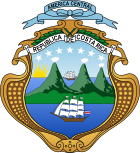Period in Costa Rican history
The Reform State or Reformist State (Spanish: Estado reformista) is the period in 20th-century Costa Rican history when the country switched from the uncontrolled capitalism and laissez-faire approach of the Liberal State into a more economically progressive Welfare State. It began about 1940 during the presidency of social reformer Rafael Angel Calderón Guardia, and ended in the 1980s with the neoliberal reforms inherent in the Washington Consensus that began after the government of Luis Alberto Monge.

